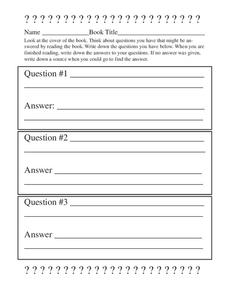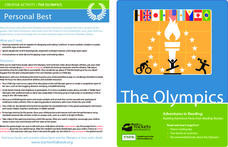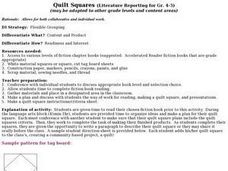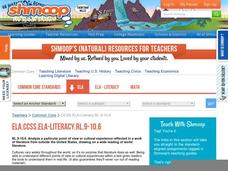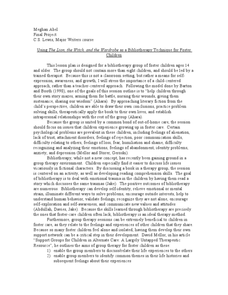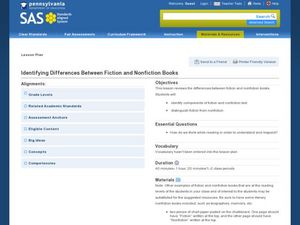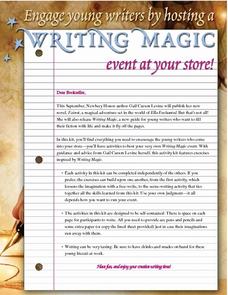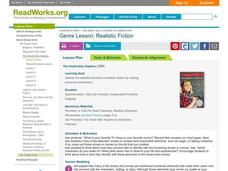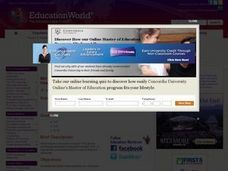Ideas From Suzi
Responding to Literature
Guide your class through a text with resources for before and after reading. Learners ask questions, discuss characters and plot points, point out elements of the reading that stood out, and compose brief summaries.
PBS
Reading Adventure Pack: The Olympics
The mini Reading Adventure Pack takes a close look at the Olympics. After reading a fiction and nonfiction story, scholars research facts about the host country or a country of their choice participating in the games. The research...
Curated OER
Library Lesson Plan
Explain the differences between fiction and non-fiction and the characteristics of a biography. Learners analyze three pieces of literature on the same topic to determine which is fiction and which is non-fiction. In the end, relate the...
Curated OER
Introduce: Comparison and Contrast
Class discussions can really make concepts come to life. The class discusses the differences between compare and contrast, read a book, then talk about ways they can compare events or characters in the story. Good leading question are...
Curated OER
My Secret War: Lesson 1
Fifth graders explore historical fiction. In this genre study lesson, 5th graders go on a text feature scavenger hunt to identify the parts of a historical fiction text. Additionally, students read the book, My Secret War and discuss...
Curated OER
Quilt Squares-Literature Reporting
Differentiate instruction with this crafty approach to demonstrating comprehension. Learners choose a fictional book at their reading level, and afterward create a quilt square. The square is "decorated" with words, illustrations, and...
Shmoop
ELA.CCSS.ELA-Literacy.RL.9-10.6
Being able to identify and understand the point of view of fictional characters across a wide range of time periods, places, and cultures is a skill that is necessary for becoming a proficient reader. It is also a skill identified in the...
Curated OER
Matemáticas
Have your young native Spanish speakers complete this math worksheet. They compare the ages of three fictional characters and complete simple addition and subtraction problems.
PBS
Extranjeros and Expansion
A three-part lesson gives light to the Unites States expansion from the view of Texans, New Mexicans, and Californians. Through videos and written activities, scholars work collaboratively to research specific individuals and their...
EngageNY
Identifying Theme: Connecting Passages from Esperanza Rising to Human Rights
Even fictional characters have rights. Scholars read selected passages from Pam Muñoz Ryan's Esperanza Rising and consider which of the five categories from the Universal Declaration of Human Rights the text relates to. They glue each...
Curated OER
Laura Joffe Numeroff "If You Give..." Book Activities
Have learners choose activities to complete based on the books by Laura Joffe Numeroff. They are introduced to If You Give a Mouse a Cookie and the other books in this series through prereading activities. They then construct a portfolio...
Curated OER
Using The Lion, the Witch, and the Wardrobe as a Bibliotherapy Technique for Foster Children
As the title suggests, this lesson is designed for a foster care therapy group. C.S. Lewis' novel provides children an opportunity to discuss life issues vicariously through fictional characters. However, the discussion questions and...
Pennsylvania Department of Education
Using Literary Elements to Compare Fiction Texts
Pupils explore language arts by reading and reflecting on literary examples. In this fiction writing lesson, students read several different cultural versions of the story "Cinderella" and discuss their interaction with the story and...
Curated OER
Identifying Differences Between Fiction and Nonfiction Books
Students explore the differences between fiction and non-fiction book. In this genre study lesson, students read examples of fiction and non-fiction and identify the characteristics of each genre. Students list the characteristics on a...
Curated OER
Fiction: Reading and Responding
Students respond and make predictions as they read an excerpt from The True Confessions of Charlotte Doyle. In this The True Confessions of Charlotte Doyle lesson, students read aloud and respond to questions that require them to...
Curated OER
A Character's Decalogue Using "Because of Winn Dixie"
Students read the book Because of Winn Dixie and then create a personal decalogue, which is a list of 10 personal beliefs. In this decalogue lesson plan, students then write a decalogue of a fictional character and write a story based on...
Curated OER
We Like to Imagine - Animals
Students describe a pretend animal. They read "The After School Monster." Students read other books and discuss whether or not the characters are real. Students make a drawing of a pretend animal and of a real animal. They make up a...
Curated OER
Writing Magic
Young scholars write a story. In this writing lesson plan, students are given a series of prompts to promote them in writing a story. The prompts include writing a free write, writing about characters, writing about a setting, writing...
Hood River County School District
Text Structure: Features and Organization
Teach learners how to interact with both fiction and non-fiction text with a packet of activities and worksheets. After looking over text structure and the difference in text features between different types of writing, readers analyze...
Curated OER
Genre Lesson: Realistic Fiction
Learners explore the elements of realistic fiction. In this genre study instructional activity, students discuss connections they have to characters in their favorite show or movie. Learners hunt for realistic fiction elements in a text...
Penguin Books
An Educator’s Guide to Ruta Sepetys
Historical fiction novels give readers a chance to step into someone else's shoes. An educator's guide from Penguin Common Core Lesson Plans provides resources to accompany three historical fiction novels written by Ruta Sepetys: Between...
Curated OER
Stir Up a Character Analysis Recipe
What ingredients make up a character? A cup of honesty, a dash of humor, a pinch of cynicism? Based on real cookbooks they review in class, learners at any grade level three and up write recipes to describe characters familiar to your...
Curated OER
What a Character!
Middle schoolers read a novel and discuss character personality. First, they analyze a character in a novel and keep a chart or web of the character's identity, which includes specific examples from the book. They then write a script...
Curated OER
The News Behind the Story
What a fun way to analyze plot, setting, and character. Learners review story elements, read a short fictional story, then turn the events of that story into a headlining news paper article. Not only does this instructional activity...


